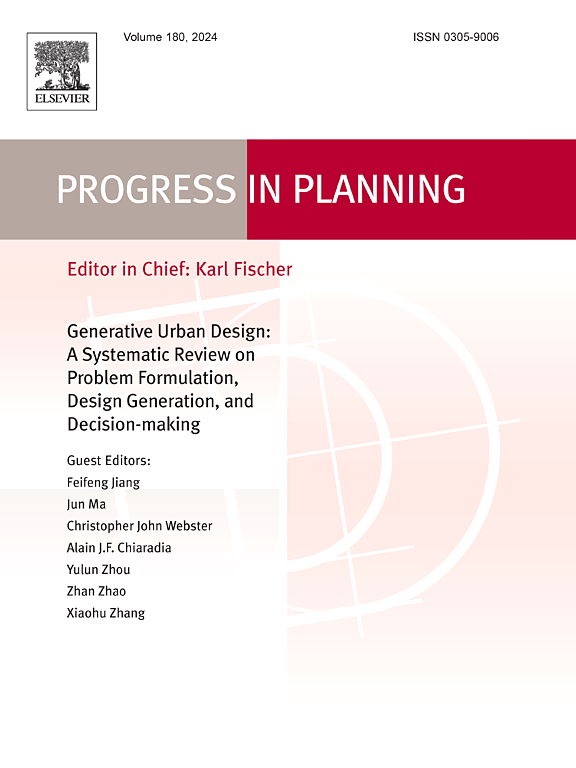要么发展,要么死亡!后政治 "大都市规划时代的土地使用战略失配问题
IF 5.7
1区 经济学
Q1 ENVIRONMENTAL STUDIES
引用次数: 0
摘要
大都市空间被视为时空动态实体,在这里,传统居住模式转变为异质的后城郊形式,整合了 复杂的社会和经济关系网络。地方空间规划协调不足通常被视为造成景观破碎化和城市持续无序扩张的关键因素。目前,大都市规划的 "后政治 "时代理应提供较少形式化的问题解决方法,不受固定的机构设置和过多官僚结构的束缚。然而,在治理的 "软空间 "内出现的综合大都市战略是否以及如何影响单个城市的地方空间战略,大都市地区的各利益相关者对空间和人口增长持何种态度,这些都还不清楚。主要的研究问题是:从不同公共管理部门的角度看,大都市地区居民点的领土和人口发展方法有何不同?本文通过对布尔诺大都市区(捷克共和国)的案例研究,对近期和规划中的人口和空间发展进行了定量空间分析,并对影响大都市区的各种规模的规划文件依据进行了定性文本分析,从而阐明了支持增长的规划战略通常所依据的叙事方式。此外,文章还从地方层面对大都市发展的意义进行了背景分析。研究结果表明,大都市综合战略对地方土地使用政策的影响微乎其微。市政空间规划的竞争机制与大都市当局的愿景相悖,加剧了空间身份和住宅 "人吃人 "的危机。腹地的人口增长在地方规划层面引发了必然性、适应性、精明增长、经济合理性和人口复兴等叙事,最终导致土地供过于求。研究结果为城市政策提供了一个解释框架,说明在多尺度的大都市范围内,人们对空间和土地使用规划的态度是多种多样的,并主张引入更有效的综合大都市空间规划工具。本文章由计算机程序翻译,如有差异,请以英文原文为准。
Grow or die! Land-use strategy mismatch in the ‘post-political’ metropolitan planning era
Metropolitan spaces are perceived as spatiotemporally dynamic entities where traditional settlement patterns transform into heterogeneous post-suburban forms, integrating complex networks of social and economic relationships. Inadequate coordination in local spatial planning is commonly seen as a crucial factor contributing to landscape fragmentation and persistent urban sprawl. The current ‘post-political’ era of metropolitan planning supposedly offers less formalized problem-solving approaches that are not burdened by institutionally fixed settings and excessive bureaucratic structures. However, it is not clear whether and how integrated metropolitan strategies emerging within the ‘soft spaces’ of governance can influence the local spatial strategies of individual municipalities and what spectrum of attitudes various stakeholders in the metropolitan area hold towards spatial and population growth. The main research question is: What differences in approaches to territorial and population development of settlements in the metropolitan area are observed from the perspective of various public administration actors? Using a case study of the Brno Metropolitan Area (Czech Republic) and employing quantitative spatial analysis of recent and planned population and spatial development, along with qualitative textual analysis of planning documentation rationale at various scales impacting the metropolitan area, this article elucidates the narratives typically underpinning pro-growth planning strategies. Additionally, it contextualizes the meanings attributed to the metropolitan dimension of development at the local level. The findings suggest a negligible impact of integrated metropolitan strategy on local land-use policies. Competitive mechanisms of municipal spatial planning contradicting metropolitan authority visions exacerbate the crisis of spatial identities and residential cannibalism. Population growth in the hinterland triggers narratives of inevitability, adaptation, smart growth, economic rationality, and population rejuvenation at the local planning level, culminating in land oversupply. The results provide urban policies with an explanatory framework for the diversity of attitudes towards spatial and land-use planning within the multi-scale metropolitan arena and argue for the introduction of more effective integrated metropolitan spatial planning tools.
求助全文
通过发布文献求助,成功后即可免费获取论文全文。
去求助
来源期刊

Progress in Planning
Multiple-
CiteScore
10.70
自引率
1.60%
发文量
26
审稿时长
34 days
期刊介绍:
Progress in Planning is a multidisciplinary journal of research monographs offering a convenient and rapid outlet for extended papers in the field of spatial and environmental planning. Each issue comprises a single monograph of between 25,000 and 35,000 words. The journal is fully peer reviewed, has a global readership, and has been in publication since 1972.
 求助内容:
求助内容: 应助结果提醒方式:
应助结果提醒方式:


